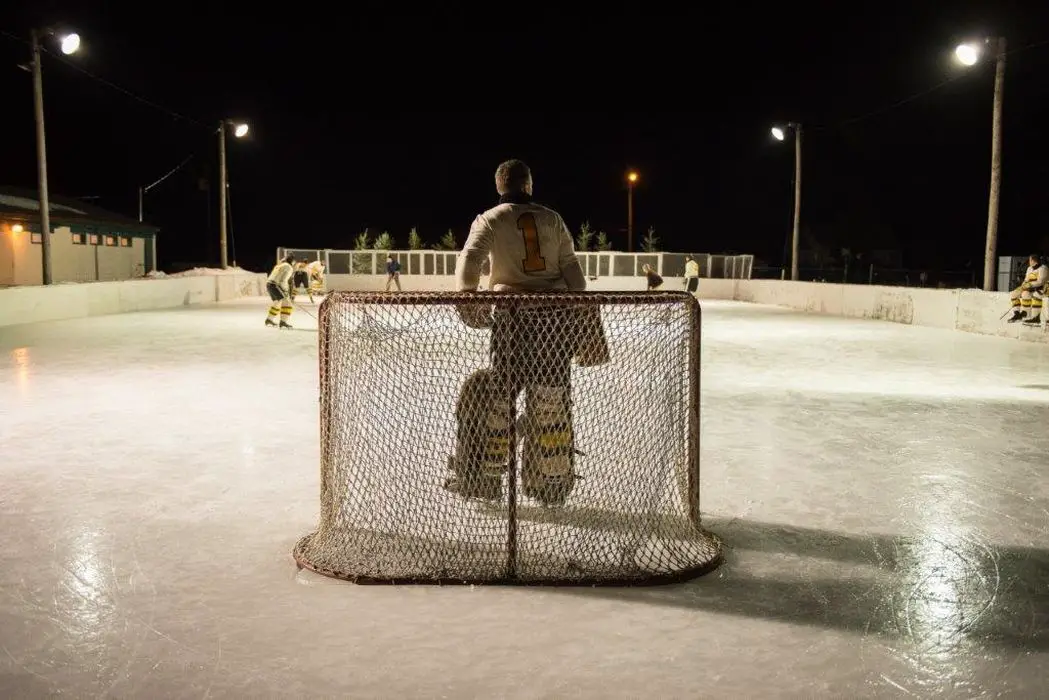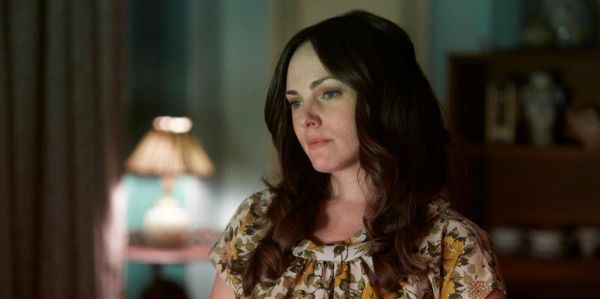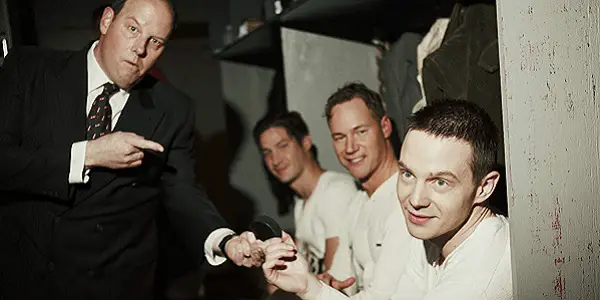GOALIE: Not The Game-Winning Goal You’re Looking For

Lee Jutton has directed short films starring a killer toaster,…
Hockey fans have been blessed over the years with a multitude of movies about our beloved sport. Some are better than others, of course, but there are nonetheless many worth watching for the way they combine the sheer excitement of teams clashing on the ice with the personal drama taking place outside the rink. The best of these is Slap Shot, the 1977 comedy starring Paul Newman and Michael Ontkean as members of a minor league hockey team that resorts to increasingly violent play to lure in crowds in the declining mill town they call home. The stakes of Slap Shot aren’t as lofty as winning a Stanley Cup or an Olympic medal, but because of that, the human drama at the center of the film is all the more relatable; they just want their team to remain financially stable so they can all keep making a living the only way they know.
Goalie might be about one of the most legendary goalies to ever play in the NHL, but the era it covers bears more of a resemblance to the rough and tumble minor league world of Slap Shot than it does to the world of Sidney Crosby and Alex Ovechkin. Directed by Canadian filmmaker Adriana Maggs from a script co-written with her sister, Jane Maggs, and inspired by a book of poetry written by their father, Randall Maggs, Goalie tells the story of Terry Sawchuk, who rose from a rough childhood in working-class Winnipeg to become the best goalie of the NHL’s “Original Six” era.
The Tragedy of Terry Sawchuk
During Terry Sawchuk’s time in the NHL, players would play through injuries out of fear of losing their one chance at a meal ticket, for with only six teams in the league, there weren’t as many opportunities to snag a starting spot as there are today. If your job was taken by an up-and-coming minor leaguer, your chances at another were slim. This was a time before hockey players were even wearing helmets for protection, let alone earning millions a year to guarantee financial security in retirement. Desperation was in the air for many, especially Sawchuk, who growing up saw one sibling die of scarlet fever and another, a promising hockey player himself who Sawchuk idolized, pass away from a heart attack at the tender age of seventeen. Once Sawchuk managed to play himself into an NHL contract with the Detroit Red Wings, he wasn’t going to give it up without a fight. As a result, his face was famously carved with scars by the end of his lengthy career, and he turned to alcohol to numb the pain.

Goalie chronicles Sawchuk’s life from his troubled beginnings — his parents are portrayed as largely cold and unloving, more concerned with the money he can send home from playing hockey than the multiple Stanley Cups he wins — all the way through his record-setting, multi-decade year career in the NHL. In addition to the physical pain that came from playing hockey, Sawchuk also suffered from depression that he attempted to treat with alcohol, resulting in an early death at the age of 41 after he injured himself in a drunken scuffle with a teammate. So, despite the various honors he earned as one of the league’s top goalies, Sawchuk’s life is less of an inspirational rags-to-riches story and more of a cautionary tale, one that reminds us that even professional athletes who seem to have it all can be struggling with issues under the surface that threaten to destroy them entirely.
Shoots, But Doesn’t Score
While these themes make Sawchuk’s story one worth revisiting, especially in light of the increased focus on head injuries and related mental health issues in the NHL, it also makes it a pretty tough one to watch unfold in cinematic form. Yet the darkness inherent in the subject matter isn’t the only thing that makes Goalie hard to watch. It’s also a strangely pieced together film, incorporating documentary-style interviews with actors playing Sawchuk’s surviving teammates in old age, reflecting on his life and legacy, into the more straightforward narrative following Sawchuk throughout his life. One imagines that the Maggs sisters wanted to tell Sawchuk’s story in a way that departed from the traditional structure of a biopic — an admirable goal, to be sure — but these talking heads only succeed in detaching the viewer from the emotional weight of the main narrative. I found myself inadvertently tuning out whenever they appeared onscreen.

By far the standout member of the cast is Kevin “Joel Maisel’s Dad” Pollak as Jack Adams, the tough-talking general manager of the Detroit Red Wings who brought Sawchuk into the team and served as a substitute father figure for him in the early days of his career. This, of course, made Adams’ decision to trade Sawchuk to the Boston Bruins in 1955 after winning three Stanley Cups together all the more upsetting for Sawchuk. The complex relationship between Sawchuk and Adams is a key emotional throughline in Goalie and by far the most interesting part of the film. This is largely due to Pollak’s bombastic performance, which lights up the screen even in Goalie’s more dour moments; he takes the film’s often hamfisted dialogue and elevates it into something worth hearing. Unfortunately, the rest of the cast, including Mark O’Brien as Sawchuk, are unable to do the same with the heavy-handed script.
My favorite thing about the film, apart from its daring to show the darker side of sports stardom? Jason Tan’s cinematography, which has a fittingly vintage edge that does make one feel as though one is watching archival footage from the mid-twentieth century NHL. The film’s colors, particularly during the hockey games, are almost reminiscent of an old Polaroid, with the striking, signature red of the Detroit Red Wings uniforms popping brightly, a perfect symbol of the promise that a contract with the NHL still holds for so many aspiring athletes. That the uniforms throughout the film are knockoffs because the NHL did not give permission for the league’s real uniforms to be used is another thing altogether, and one that ends up being accidentally amusing, but still, they look fabulous.
Goalie: Conclusion
At the heart of Goalie is a tragic tale worth telling, but unfortunately the film, despite its best intentions, fails to do it justice.
What do you think? Are you familiar with the career of Terry Sawchuk? Do you have a favorite hockey movie? Share your thoughts in the comments below.
Goalie is released in theaters in the U.S. on January 31, 2020 and will be available on DVD and VOD on February 25, 2020. You can find more international release dates here.
Does content like this matter to you?
Become a Member and support film journalism. Unlock access to all of Film Inquiry`s great articles. Join a community of like-minded readers who are passionate about cinema - get access to our private members Network, give back to independent filmmakers, and more.
Lee Jutton has directed short films starring a killer toaster, a killer Christmas tree, and a not-killer leopard. Her writing has appeared in publications such as Film School Rejects, Bitch: A Feminist Response to Pop Culture, Bitch Flicks, TV Fanatic, and Just Press Play. When not watching, making, or writing about films, she can usually be found on Twitter obsessing over soccer, BTS, and her cat.












